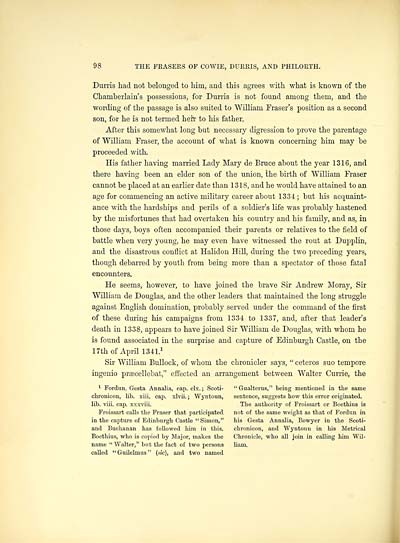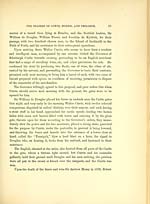Frasers of Philorth > Volume 1
(130)
Download files
Complete book:
Individual page:
Thumbnail gallery: Grid view | List view

98 THE FEASEBS OF COWIE, DUEEIS, AND PHILORTH.
Durris had not belonged to him, and this agrees with what is known of the
Chamberlain's possessions, for Durris is not found among them, and the
wording of the passage is also suited to William Fraser 's position as a second
son, for he is not termed heir to his father.
After this somewhat long but necessary digression to prove the parentage
of William Fraser, the account of what is known concerning him may be
proceeded with.
His father having married Lady Mary de Bruce about the year 1316, and
there having been an elder son of the union, the birth of William Fraser
cannot be placed at an earlier date than 1318, and he would have attained to an
age for commencing an active military career about 1334 ; but his acquaint-
ance with the hardships and perils of a soldier's life was probably hastened
by the misfortunes that had overtaken his country and his family, and as, in
those days, boys often accompanied their parents or relatives to the field of
battle when very young, he may even have witnessed the rout at Dupplin,
and the disastrous conflict at Halidon Hill, during the two preceding years,
though debarred by youth from being more than a spectator of those fatal
encounters.
He seems, however, to have joined the brave Sir Andrew Moray, Sir
William de Douglas, and the other leaders that maintained the long struggle
against English domination, probably served under the command of the first
of these during his campaigns from 1334 to 1337, and, after that leader's
death in 1338, appears to have joined Sir William de Douglas, with whom he
is found associated in the surprise and capture of Edinburgh Castle, on the
17th of April 1341. 1
Sir William Bullock, of whom the chronicler says, " ceteros suo tempore
ingenio prascellebat," effected an arrangement between Walter Currie, the
1 Fordvm, Gesta Annalia, cap. clx. ; Scoti- "Gualterus," being mentioned in the same
chronicon, lib. xiii. cap. xlvii. ; Wyntoun, sentence, suggests how this error originated,
lib. viii. cap. xxxviii. The authority of Froissart or Boethius is
Froissart calls the Fraser that participated not of the same weight as that of Fordim in
in the capture of Edinburgh Castle "Simon," his Gesta Annalia, Bowyer in the Scotl-
and Buchanan has followed him in this. chronicon, and Wyntoun in his Metrical
Boethius, who is copied by Major, makes the Chrouicle, who all join in calling him Wil-
name " Walter," but the fact of two persons liam.
called "Guilehnus" {sic), and two named
Durris had not belonged to him, and this agrees with what is known of the
Chamberlain's possessions, for Durris is not found among them, and the
wording of the passage is also suited to William Fraser 's position as a second
son, for he is not termed heir to his father.
After this somewhat long but necessary digression to prove the parentage
of William Fraser, the account of what is known concerning him may be
proceeded with.
His father having married Lady Mary de Bruce about the year 1316, and
there having been an elder son of the union, the birth of William Fraser
cannot be placed at an earlier date than 1318, and he would have attained to an
age for commencing an active military career about 1334 ; but his acquaint-
ance with the hardships and perils of a soldier's life was probably hastened
by the misfortunes that had overtaken his country and his family, and as, in
those days, boys often accompanied their parents or relatives to the field of
battle when very young, he may even have witnessed the rout at Dupplin,
and the disastrous conflict at Halidon Hill, during the two preceding years,
though debarred by youth from being more than a spectator of those fatal
encounters.
He seems, however, to have joined the brave Sir Andrew Moray, Sir
William de Douglas, and the other leaders that maintained the long struggle
against English domination, probably served under the command of the first
of these during his campaigns from 1334 to 1337, and, after that leader's
death in 1338, appears to have joined Sir William de Douglas, with whom he
is found associated in the surprise and capture of Edinburgh Castle, on the
17th of April 1341. 1
Sir William Bullock, of whom the chronicler says, " ceteros suo tempore
ingenio prascellebat," effected an arrangement between Walter Currie, the
1 Fordvm, Gesta Annalia, cap. clx. ; Scoti- "Gualterus," being mentioned in the same
chronicon, lib. xiii. cap. xlvii. ; Wyntoun, sentence, suggests how this error originated,
lib. viii. cap. xxxviii. The authority of Froissart or Boethius is
Froissart calls the Fraser that participated not of the same weight as that of Fordim in
in the capture of Edinburgh Castle "Simon," his Gesta Annalia, Bowyer in the Scotl-
and Buchanan has followed him in this. chronicon, and Wyntoun in his Metrical
Boethius, who is copied by Major, makes the Chrouicle, who all join in calling him Wil-
name " Walter," but the fact of two persons liam.
called "Guilehnus" {sic), and two named
Set display mode to:
![]() Universal Viewer |
Universal Viewer | ![]() Mirador |
Large image | Transcription
Mirador |
Large image | Transcription
Images and transcriptions on this page, including medium image downloads, may be used under the Creative Commons Attribution 4.0 International Licence unless otherwise stated. ![]()
| Histories of Scottish families > Frasers of Philorth > Volume 1 > (130) |
|---|
| Permanent URL | https://digital.nls.uk/96567060 |
|---|
| Attribution and copyright: |
|
|---|
| Description | A selection of almost 400 printed items relating to the history of Scottish families, mostly dating from the 19th and early 20th centuries. Includes memoirs, genealogies and clan histories, with a few produced by emigrant families. The earliest family history goes back to AD 916. |
|---|

